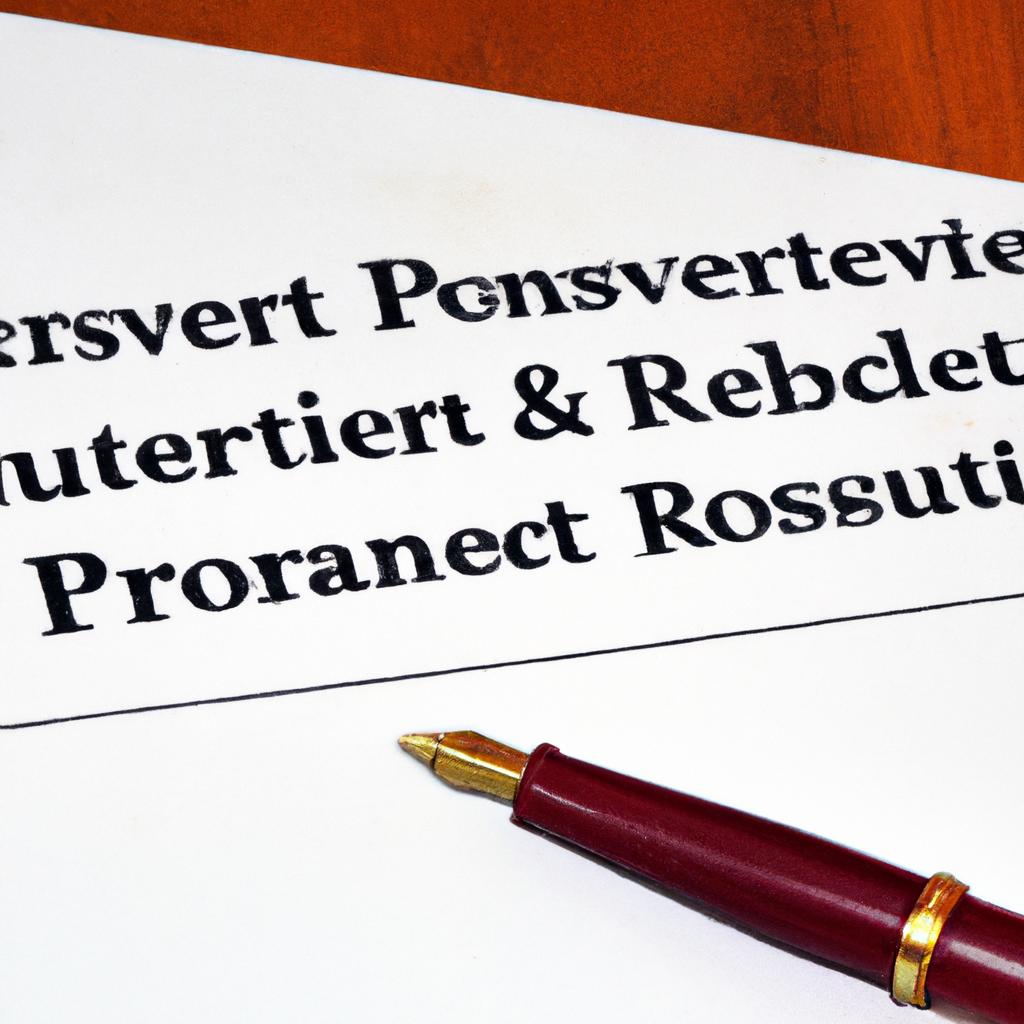In the intricate world of estate planning, the terms ”revocable trust” and “living trust” are often used interchangeably, leading to confusion among individuals seeking to protect their assets and ensure their loved ones are cared for. As seasoned attorneys at Morgan Legal Group in New York City, we understand the nuances of these trust structures and the impact they can have on your estate plan. In this article, we will delve into the key differences between a revocable trust and a living trust, shedding light on their unique features and helping you make informed decisions for the future security of your assets.
Key Differences Between Revocable Trust and Living Trust
When it comes to estate planning, understanding the key differences between a revocable trust and a living trust is crucial. Both types of trusts offer ways to manage assets during your lifetime and after you pass away, but they have distinct features that cater to different needs and goals.
A revocable trust, also known as a living trust, allows you to retain control over the trust assets during your lifetime and make changes or revoke the trust at any time. On the other hand, a living trust becomes irrevocable upon your death, meaning the terms of the trust can no longer be altered. This can provide greater protection for beneficiaries and ensure that your wishes are carried out as specified in the trust document. Additionally, a revocable trust typically helps assets avoid probate, while a living trust may offer more privacy since it does not become part of the public record.

Understanding the Purpose and Benefits of a Revocable Trust
When it comes to estate planning, is essential. A revocable trust, also known as a living trust, is a legal arrangement that allows individuals to transfer their assets into a trust during their lifetime. Unlike a will, a revocable trust can be altered or revoked by the individual who created it, providing flexibility and control over their assets.
One key difference between a revocable trust and a living trust is that a revocable trust can help avoid the probate process. By transferring assets into the trust, they are no longer considered part of the individual’s estate upon their passing, which can streamline the distribution of assets to beneficiaries. Additionally, a revocable trust can provide privacy, as the terms of the trust do not become public record like a will would. Overall, a revocable trust can provide peace of mind, control over assets, and efficient estate distribution for individuals and their families.

Detailed Comparison of Tax Implications in Revocable and Living Trusts
When it comes to estate planning, understanding the tax implications of revocable and living trusts is crucial. Both types of trusts have their own unique tax considerations that individuals need to be aware of. Here is a detailed comparison of the tax implications in revocable and living trusts:
- Attribution of Income: In a revocable trust, the grantor is typically responsible for reporting and paying taxes on any income generated by trust assets. On the other hand, in a living trust, the grantor may still be responsible for paying taxes on the trust income, but it is also possible for the trust itself to be taxed as a separate entity.
- Step-up in Basis: One key difference between revocable and living trusts is how they impact the basis of assets. With a revocable trust, assets transferred into the trust retain their original basis. However, with a living trust, assets can receive a step-up in basis upon the death of the grantor, potentially reducing capital gains taxes for beneficiaries.
| Revocable Trust | Living Trust |
|---|---|
| No step-up in basis for assets | Potential step-up in basis for assets |
| Grantor responsible for income taxes | Possibility of trust being taxed as a separate entity |

Recommendations for Choosing the Right Trust Structure for Your Estate Plan
When it comes to choosing the right trust structure for your estate plan, it is essential to understand the key differences between a revocable trust and a living trust. While both options can be beneficial for your estate planning needs, there are important distinctions to consider.
A revocable trust, also known as a living trust, allows you to make changes to the trust during your lifetime. This type of trust offers flexibility and control, as you can amend or revoke the trust at any time. On the other hand, a living trust becomes irrevocable upon your death, meaning the terms of the trust cannot be altered. It is crucial to carefully consider your specific needs and goals when deciding between a revocable trust and a living trust.
Q&A
Q: What is the main difference between a revocable trust and a living trust?
A: A revocable trust and a living trust are actually the same thing. They are often used interchangeably to refer to a trust that is created during the grantor’s lifetime and can be changed or revoked.
Q: Can you explain the concept of a revocable trust in simple terms?
A: A revocable trust is a legal arrangement where the grantor transfers ownership of their assets to a trustee, who manages those assets for the benefit of the beneficiaries named in the trust. The grantor retains the right to change or revoke the trust at any time during their lifetime.
Q: How does a revocable trust differ from an irrevocable trust?
A: The main difference between a revocable trust and an irrevocable trust is that, once created, an irrevocable trust cannot be changed or revoked by the grantor. This means that the assets in an irrevocable trust are no longer owned by the grantor and are generally not considered part of their estate for tax purposes.
Q: What are some common reasons for creating a revocable trust?
A: Some common reasons for creating a revocable trust include avoiding probate, ensuring privacy, providing for minor children or beneficiaries with special needs, and managing assets in the event of incapacity.
Q: How can someone determine if a revocable trust is the right estate planning strategy for them?
A: It’s important to consult with a qualified estate planning attorney or financial advisor to determine if a revocable trust is the right choice for your specific circumstances. They can help you understand the benefits and potential drawbacks of using a revocable trust as part of your estate plan.
Insights and Conclusions
In conclusion, understanding the difference between revocable trust and living trust can help individuals make informed decisions about their estate planning. Whether you opt for a revocable trust for its flexibility or a living trust for its potential for avoiding probate, each option offers unique benefits and considerations. It is important to consult with a qualified estate planning attorney to determine which type of trust best suits your individual needs and goals. By taking the time to carefully consider your options, you can create a comprehensive estate plan that provides peace of mind for yourself and your loved ones. So, choose wisely, and plan ahead for a secure future.
 Remember to proofread and edit the article before submitting it!
Remember to proofread and edit the article before submitting it!
Introduction:
In today’s world, creating a trust is becoming increasingly popular among individuals and families to protect their assets and ensure their inheritances are handled according to their wishes. However, when it comes to trusts, there are various types to choose from, including revocable and living trusts. While the two might sound similar, they are actually quite different in terms of their purpose and features. In this article, we will explore the key differences between these two types of trusts and help you determine which one might be the best fit for your specific needs.
What is a Trust?
First, let’s establish a brief understanding of what a trust is. A trust is a legal document that allows you to transfer ownership of your assets to a third party, known as the trustee, who will then manage and distribute the assets to your beneficiaries according to your wishes. It serves as a valuable estate planning tool, as it can help avoid probate, minimize estate taxes, and protect your assets from potential creditors.
What is a Revocable Trust?
A revocable trust, also known as a living trust, is a trust that can be amended, modified, or revoked during your lifetime. This means that as the trust creator, you have the power to make changes to the trust at any time while you are alive. It is commonly used as a means of avoiding probate, which is the legal process of distributing a person’s assets after their death.
Pros of a Revocable Trust:
1. Flexibility: One of the biggest advantages of a revocable trust is its flexibility. As the trust creator, you have control over when and how your assets will be distributed to your beneficiaries. You can also make changes to the trust as your circumstances change over time, such as adding or removing beneficiaries or assets.
2. Avoids Probate: Another benefit of a revocable trust is that it allows your assets to pass directly to your beneficiaries, bypassing the probate process. This can save time, money, and keep your affairs private as probate is a public record.
3. Provides Privacy: Since revocable trusts do not go through probate, your assets and beneficiaries can be kept confidential. This is particularly beneficial for individuals who value their privacy.
Cons of a Revocable Trust:
1. Cost: Setting up a revocable trust can be more expensive than creating a will. It typically involves legal fees and ongoing maintenance costs, such as retitling assets in the trust’s name, which can add up over time.
2. Limited Asset Protection: While a revocable trust can protect your assets from probate, it does not offer the same level of protection from creditors or lawsuits as an irrevocable trust. This is because you still have control over the assets and can access them at any time.
What is a Living Trust?
A living trust is a type of trust that goes into effect during your lifetime, meaning it is created while you are alive and can be used during your lifetime to manage your assets. It is an essential part of an estate plan, and it specifies how your assets will be managed and distributed during your lifetime and after your death.
Pros of a Living Trust:
1. Avoids Probate: Similar to a revocable trust, a living trust also bypasses the probate process, saving time and money for your beneficiaries.
2. More Control Over Distribution: A living trust allows you to dictate exactly how and when your assets will be distributed to your beneficiaries. This is especially beneficial if you have minor children or beneficiaries with special needs.
3. Asset Protection: Unlike a revocable trust, a living trust offers more asset protection as you transfer ownership of your assets to the trust. This means they are shielded from potential creditors or lawsuits.
Cons of a Living Trust:
1. Irrevocable: As the name suggests, a living trust cannot be modified or revoked once created. This means you cannot make changes to the trust, even if your circumstances change.
2. Initial Cost: Creating a living trust can be more expensive than a revocable trust due to the preparation and transfer of assets to the trust. However, the long-term savings in avoiding probate can outweigh the initial cost.
3. Ongoing Maintenance: Like a revocable trust, a living trust also requires ongoing maintenance, such as transferring assets to the trust’s name, which can be time-consuming and expensive.
Key Differences Between Revocable and Living Trust:
1. Flexibility: A revocable trust offers more flexibility as it can be amended or revoked at any time during your lifetime, while a living trust is irrevocable once created.
2. Control Over Distribution: A living trust provides more control over how and when your assets are distributed to your beneficiaries as compared to a revocable trust.
3. Asset Protection: A living trust offers more asset protection than a revocable trust, as you transfer ownership of your assets to the trust.
4. Privacy: Both trusts offer privacy in terms of avoiding probate, but a living trust can also keep your beneficiaries and assets confidential.
5. Cost: While both trusts involve legal fees, a revocable trust can be more expensive in the long run due to ongoing maintenance costs and a living trust’s more extensive initial costs.
Which Trust is Right For You?
The choice between a revocable and living trust ultimately depends on your specific needs and preferences. If you value flexibility and control, a revocable trust might be the better option. On the other hand, if asset protection and privacy are your main concerns, a living trust might be more suitable. It is always best to consult with a trusted estate planning attorney to determine which trust aligns with your goals and objectives.
Conclusion:
In conclusion, while both revocable and living trusts have similar benefits, they also have crucial differences that can impact your estate plan. By understanding these differences, you can make an informed decision on which trust is the right fit for your unique circumstances. Additionally, it is always best to seek professional advice when creating a trust to ensure your wishes are properly documented and your assets are protected.

